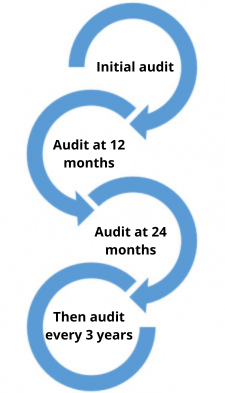
Faced with the many challenges posed by the rise of artificial intelligence, ISO and IEC have jointly developed the ISO/IEC 42001 standard for the implementation of an AI management system, the aim being to strengthen confidence without undermining innovation. LNE issues this certificate and can support you in this process.
Artificial intelligence (AI) is the subject of high expectations on the part of companies and institutions, even though its implementation and use can generate risks (threats to security, confidentiality, unpredictability, reliability, system hardware failures, etc.), which need to be taken into account by the associated standards and certifications.
To help organisations develop or use AI systems responsibly, without compromising their innovation objectives and while meeting regulatory requirements and stakeholder expectations, the International Organisation for Standardisation (ISO) and the International Electrotechnical Commission (IEC) have jointly developed the ISO/IEC 42001 standard for the implementation of a management system for artificial intelligence.
In particular, this standard aims to establish management mechanisms to ensure the quality of artificial intelligence systems. It covers aspects such as design, data quality and qualification, as well as identifying and understanding the risks associated with new AI applications.
Objective of ISO 42001
This global standard provides a robust framework and structure within which AI systems can be developed, deployed and used responsibly.
It sets out requirements and recommendations for establishing, implementing, maintaining and continuously improving an AI management system in the context of an organisation.
Its aim is to help organisations to :
- develop or use AI responsibly,
- meet applicable regulatory requirements,
- meet the obligations and expectations of stakeholders.
In this way, it provides practical support to companies in optimising the use of AI by guaranteeing a level of control and confidence in the systems developed.
Who is ISO 42001 aimed at?
This standard concerns any type of organization wishing to implement an ISMS for AI, whatever its size or nature:
- AI providers (AI platform providers, suppliers of AI products or services)
- AI manufacturers (AI developers, designers, operators, testers and evaluators, deployers and all other AI professionals)
- AI customers, including AI users
- AI service providers (AI system integrators and data providers)
- les sujets de l'IA, y compris les personnes concernées et les autres sujets
- the competent authorities (decision-makers, regulators).
Why get ISO 42001 certification, and what are the benefits?
- Reap the benefits of AI while ensuring that systems are developed and used responsibly.
- Proactively and dynamically anticipate the implementation of the requirements of future European regulations (IA ACT).
- Strengthen the confidence of the various stakeholders in your organisation and your AI products or services.
- Demonstrate both internally and externally your drive for continuous improvement and optimisation of internal processes.
- Set yourself apart from the competition with a reinforced and independently certified trust criterion.
- Implement AI securely, with guaranteed accountability and traceability.
- Integrate the safety, security, fairness, transparency and data quality aspects of AI systems at every stage of the lifecycle.
- Deploying critical processes such as risk management, lifecycle management and data quality.
LNE support in obtaining ISO 42001 certification
As well as being able to issue an ISO 42001 certificate, LNE can help you prepare for certification beforehand, to optimise your chances of success:
- Technical and regulatory assistance (presentation of the standards and their requirements to help you understand and implement them).
- Blank audit (assess any discrepancies and take corrective action before you start certification).
ISO 42001 certification combines perfectly with the LNE AI process certification which certifies the quality of the design, development, evaluation and operational maintenance processes, while reliably demonstrating the levels of performance, robustness, ethics and explainability achieved by the various AI solutions.
Opting for ISO 42001 certification and AI process certification gives you a comprehensive framework for ensuring quality, safety and ethics in the field of AI, and better prepares you for future European regulations (IA Act).
If you would like to find out more about this approach contact us.
How do you obtain ISO 42001 certification?
Certification stages
- Planification : a project manager with expertise in your sector will plan the audit with you
- Documentary assessment(stage 1): the lead auditor carries out an assessment to understand the context of the organisation, its IAMS and its level of preparedness for the on-site audit.
- On-site audit (stage 2): the audit manager organises a full review of your information security management system, taking a technical and operational approach.
- Restitution : the audit manager presents you with a summary of the audit findings
- Reading committee : your certification project manager presents your application to the committee
- Notification of the decision :LNE informs you of the decision

- Monitoring and renewal :An audit is then carried out every year.

These surveillance and renewal audits operate on the basis of an 3-year cycle :
- a follow-up audit 1 to be carried out after 12 months,
- a follow-up audit 2 to be carried out after 24 months,
- then a renewal audit after 3 years.
Why choose LNE
- For many years, LNE has been assisting manufacturers, institutions and vital operators with their certification processes through various services such as ISO 27 001, HDS and ISO 27701 certification, and French and European regulatory certification (CE marking).
- More than 10 years' experience in evaluating intelligent technologies,
- More than 900 evaluations of artificial intelligence systems carried out, particularly in language processing, image processing and robotics,
- Expert in the creation and use of vast, high-quality, structured and annotated test databases,
- The only organisation in France with multi-disciplinary expertise enabling it to offer a complete range of services: technical assistance, AI evaluation, AI certification.





